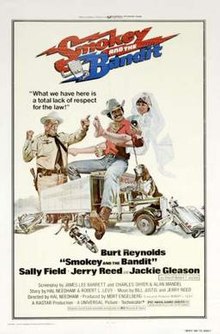
Well, thank you, Mr. Bandit. And as the pursuer, may I say you’re the goddamnedest pursuee I’ve ever pursued. Now that the mutual bullshit is over, WHERE ARE YOU, YOU SOMBITCH? Big Enos (Pat McCormick) wants to drink Coors at a truck show, but in 1977 it’s illegal to sell Coors east of the Mississippi River without a permit. Truck driver Bo ‘Bandit’ Darville (Burt Reynolds) agrees to pick up the beer in Texas and drive it to Georgia within 28 hours: he’ll take his Trans-Am and act as a diversion to the tractor trailer carrying the booty by his colleague Cledus ‘Snowman’ (Jerry Reed). When Bo picks up runaway bride Carrie (Sally Field), he attracts the attention of Sheriff Buford T. Justice (Jackie Gleason). Angry that Carrie has run out on the wedding to his son, Justice embarks on a high-speed chase after Bandit across Arkansaw right back to Georgia … When you tell somebody something it depends which part of the United States you’re standing in as to how dumb you are. Stuntman Hal Needham moved into Burt Reynolds’ poolhouse when his marriage broke up. When they shot Gator they found nobody could get Coors beer east of the Mississippi so Needham started scribbling on legal pads and came up with a screenplay with terrible dialogue involving the transportation of beer across state lines. The story was improved with contributions from producer Robert Levy. It then got a rewrite from James Lee Barrett and Charles Shyer & Alan Mandel. With Reynolds (reluctantly) attached, the movie gave Needham his directing debut and it grossed second only to Star Wars in 1977 (and Reynolds had turned down the role of Han Solo!) This went stratospheric on a global scale. Why did it strike such a chord, not just in the US, where the southwest drive-in circuit was practically the only logical destination for the good ol’ boy persona Reynolds had perfected in White Lightning and its sequel, Gator, which he directed and which he was now keen to leave behind? It has a simplicity that goes back to the Keystone Cops, a pure exercise in slapstick and stunts that pivots on one long car chase, from the beginning to the end of the film, with an exploitation core of the redneck trickster character: it could only be played by Reynolds, who embodied charm, daring and guile in an enviable physique. He also had a unique way with put-downs which he did with a smirk and a wink that made you love him. He’d been commandeering that style for a decade, even before he made it big with Deliverance. He was a star beloved of audiences after that and this catapulted him to the number one position in the box office for five straight years after the previous five hadn’t seen him outside the Top 10. His easygoing persona, wisecracking and sex appeal made him catnip to audiences. The Seventies were a particularly good era for road movies too; CB radio was popular and trucks were big news: Cledus gets roughed up by bikers in a bar and he responds by showing us the motorsickle era is over when he tramples the gang’s machines – trucks trump bikes! Field’s naturalistic acting style makes her relationship with Bandit totally believable and Fred the bassett hound (Burt had one called Clyde) just makes us love him even more. Without a comic foil however the setup would not work and the great Gleason is superb as the pesky ornery sheriff with an idiot son: There’s no way – no way! – you could come from my loins. First thing I do when we get home is punch your mama in the mouth! He’s loathsome, funny, irascible and encumbered with a jackass offspring so you hope he doesn’t suffer too much – for maybe just a minute. (He was allegedly based on Reynolds’ father, a police chief in Florida). Burdette is played by Pat McCormick who regularly wrote for Johnny Carson, the host of The Tonight Show where Reynolds made dozens of hilarious appearances (it’s how John Boorman found him for Deliverance when he was guest hosting a particularly rowdy set of guests). It’s a buoyant, feel good outing with a convoy and what amounts to a demolition derby. For the audience the prospect of getting one over on The Man is irresistible and of course what we have here is a community rallying to help an innocent anarchist over the state line. This was hugely influential on the culture – as The Dukes of Hazzard and The Fall Guy would prove, with everything crystallised by Reynolds’ screen character writ large across primetime TV for years to come. Sublime, existential entertainment. That’s a big 10-4!




